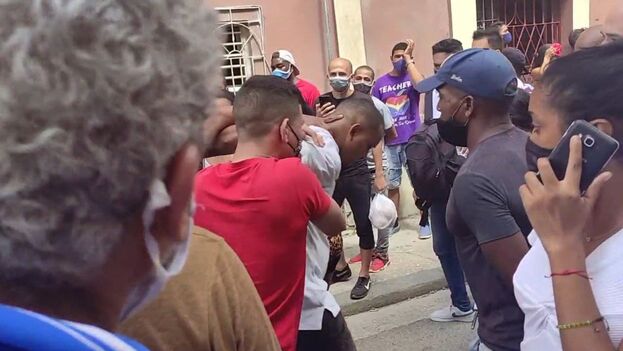
![]() 14ymedio, Madrid, 14 November 2022 — On Monday the organisations Democratic Spaces and Cuba Decide asked the Canadian government to sanction the Cuban leader Miguel Díaz-Canel and a further nine officials, as well as the bodies known as the boinas negras (black berets) — the National Special Brigade of the Ministry of the Interior; and the boinas rojas (red berets) — Prevention Troops of the Revolutionary Armed Forces, for being “responsible for grave violations of human rights, especially after the peaceful protests of 11 July 2021“.
14ymedio, Madrid, 14 November 2022 — On Monday the organisations Democratic Spaces and Cuba Decide asked the Canadian government to sanction the Cuban leader Miguel Díaz-Canel and a further nine officials, as well as the bodies known as the boinas negras (black berets) — the National Special Brigade of the Ministry of the Interior; and the boinas rojas (red berets) — Prevention Troops of the Revolutionary Armed Forces, for being “responsible for grave violations of human rights, especially after the peaceful protests of 11 July 2021“.
In the list are the ministers: Álvaro López Miera and Lázaro Alberto Álvarez Casas, police bosses like Óscar Callejas Valcárcel and his deputy Eddy Manuel Sierra Arias; and higher officials Pedro Orlando Martínez Fernández, Roberto Abelardo Jiménez González, Roberto Legrá Sotolongo, Andrés Laureano González Brito and Romárico Vidal Sotomayor García.
In a joint communique, both organisations offer a reminder that the Canadian prime minister, Justin Trudeau, expressed his concern after 11J for “the violent repression of the protests by the Cuban regime”, condemned “the detentions and the repression of the authorities against peaceful demonstrators” and affirmed that “Cubans have the right to express themselves and to be listened to”.
Now, the NGOs are asking Ottawa to accompany “with action” the condemnation of the repression of the 2021 protests that he made, and that, just like the United States, they impose “a series of selective sanctions on the Cuban officials and bodies which are responsible for the violations of human rights”.
The communique lists the repressive sentences handed out to demonstrators of 11J and declares that there were “so many arbitrary detentions that Cuba is now the principal jailer of the Americas”.
Between 2,000 and 8,000 people were detained in the months which followed 11J, and, up until 31 October this year, there were 1,027 people still in prison, among them 34 minors.
Democratic Spaces and Cuba Decide also remind us that Human Rights Watch confirmed the systematic use of “arbitrary detention and ill treatment of detainees, and penal processes full of abuses” by Cuban officials.
It’s not the first time that Democratic Spaces has approached the Canadian Parliament with a demand for respect for human rights on the Island. Their leader, the Cuban Michael Lima, has made various requests for Ottowa to take measures.
The most recent of these was launched in October last year and asked the Canadian Executive to request the Cuban regime to liberate “immediately and unconditionally all those detained and imprisoned for exercising their freedom of expression and of peaceful gathering” after 11 July and that they unite with the request by Amnesty International and the UN to demand the release of José Daniel Ferrer, Luis Manuel Otero Alcántara, Esteban Rodríguez, Maykel Castillo Osorbo “and all prisoners of conscience in Cuba”.
Translated by Ricardo Recluso
____________
COLLABORATE WITH OUR WORK: The 14ymedio team is committed to practicing serious journalism that reflects Cuba’s reality in all its depth. Thank you for joining us on this long journey. We invite you to continue supporting us by becoming a member of 14ymedio now. Together we can continue transforming journalism in Cuba.
